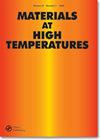马氏体电厂钢断裂强度预测
IF 0.9
4区 材料科学
Q4 MATERIALS SCIENCE, MULTIDISCIPLINARY
引用次数: 0
摘要
摘要马氏体电厂钢的抗蠕变性能在很大程度上取决于其组织中各种析出相的分散程度。因此,要可靠地预测这类合金的断裂强度,就需要准确地描述其在使用过程中的组织演变。计算这些钢的同时析出动力学和硬化的材料模型以前已经报道过。本文提出的蠕变断裂模型是前人研究的自然延伸。用9-12% Cr钢的蠕变断裂实验数据验证了该模型的有效性。它允许合金条件(如成分和热处理)的变化对给定合金等级的断裂强度进行定量评估。结果表明,这种变化会导致计算出的断裂强度存在显著差异,这被认为是造成实验数据广泛分散的主要原因。关键词:断裂强度断裂寿命沉淀电厂钢材材料建模披露声明作者未报告潜在的利益冲突。本文章由计算机程序翻译,如有差异,请以英文原文为准。
Rupture strength prediction of martensitic power plant steels
ABSTRACTThe creep resistance of martensitic power plant steels depends strongly on the dispersion of various types of precipitates in the microstructure. Reliable prediction of rupture strength of such alloys thus demands accurate description of the microstructure evolution during service. A material model that calculates the simultaneous precipitation kinetics and hardening in these steels has been reported previously. The creep rupture model reported here is a natural extension of the previous research. This model has been validated against experimental creep rupture data of wide-used 9–12% Cr steels. It allows the effect of variation in alloy conditions, such as composition and heat treatments, on rupture strength to be quantitatively evaluated for a given alloy grade. Results show that such variations can lead to significant differences in the calculated rupture strength, which are believed to be largely responsible for the wide scatter in the experimental data.KEYWORDS: Rupture strengthrupture lifeprecipitationpower plant steelsmaterials modelling Disclosure statementNo potential conflict of interest was reported by the authors.
求助全文
通过发布文献求助,成功后即可免费获取论文全文。
去求助
来源期刊

Materials at High Temperatures
工程技术-材料科学:综合
CiteScore
1.90
自引率
15.40%
发文量
58
审稿时长
>12 weeks
期刊介绍:
Materials at High Temperatures welcomes contributions relating to high temperature applications in the energy generation, aerospace, chemical and process industries. The effects of high temperatures and extreme environments on the corrosion and oxidation, fatigue, creep, strength and wear of metallic alloys, ceramics, intermetallics, and refractory and composite materials relative to these industries are covered.
Papers on the modelling of behaviour and life prediction are also welcome, provided these are validated by experimental data and explicitly linked to actual or potential applications. Contributions addressing the needs of designers and engineers (e.g. standards and codes of practice) relative to the areas of interest of this journal also fall within the scope. The term ''high temperatures'' refers to the subsequent temperatures of application and not, for example, to those of processing itself.
Materials at High Temperatures publishes regular thematic issues on topics of current interest. Proposals for issues are welcomed; please contact one of the Editors with details.
 求助内容:
求助内容: 应助结果提醒方式:
应助结果提醒方式:


